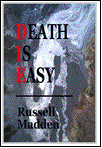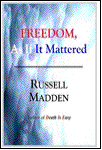 |
 |
|
|
 |
 |
|
|
4-20-98
To the Editor:
In his lengthy comments to criticisms of his essay on Rand's "The 'Conflicts' of Men's Interests," Murray Franck continues his misinterpretation of the "benevolent universe" principle (BNP) and commits a few additional errors.
1. The Benevolent Universe Principle. Franck says he is not arguing for a malevolent universe premise, yet his examples still focus on negative events to bolster his case. There is no conflict between the BNP and the ideas of values/valuers/goals. The BNP states that negative events are not "the essence of human life." (Peikoff, Lexicon, p. 51). Yes, accidents occur, disease happens, disability occurs, indeed, everyone will experience death and unhappiness someday. Some people will experience such problems over and over; their lives are thoroughly miserable. Yet if these were the usual, normal metaphysical conditions of everyday life for all individual humans, humanity would have become extinct long ago.
The BNP states that the universe is neutral, not metaphysically hostile to life; that, by using reason and logic and taking appropriate actions (i.e., acting in accordance with reality), values can and usually will be achieved. The negative is the exception, not the rule.
Despite his protestations, Franck focuses on suffering, on the negative, on pain as the norm of life; a complete inversion of a life-centered philosophy such as Objectivism. His equating of the BNP with a terminally ill patient being told that "God is on his side" is a non sequitur. Arguing for the BNP is not offered as a palliative for problems in one's life. On the contrary, arguing for the BNP tells a suffering individual that life can improve; that he is not doomed to pain from some inherent principle of the universe; that he need not fatalistically accept and endure whatever nastiness strikes him. Arguing against the BNP is to dwell on the unfortunate disasters of life and over-generalize them to all of human existence.
2. The Short-term and Long-term. Neither I nor Rand argued for the long-term over the short-term. Both need to be integrated, a process Franck initially neglected by focusing on only short-term examples. As for "conflict" and "interests," Rand's usage differs precisely from common usage by incorporating the fact that a rational person does not desire the unearned; that desires are not the equivalent of thoughts. Two people might each (perhaps even rationally) want a particular value and may not (in the short-term) agree that it belongs to her opponent. Yet if one of the people gains more information and realizes she did not earn that value and thus does not deserve it, (eventually) she will be able to realize no metaphysical conflict existed. Only her belief and desire were in conflict with reality.
Franck seems to believe that the BNP and Rand's views on conflicts somehow implies that no one will ever experience emotional or physical pain. They do not. He talks of "the losers' interests conflict[ing] with those of the winners." One may lose an opportunity and be sad/upset/etc. Yet how can one lose a value which was never one's in the first place? Franck seems to long for or at least require a "perfect" market; a free society which works "perfectly"; "a mass level of human perfection" in order to accept the BNP and Rand's view of "conflict" among rational people. His error is similar to the skeptics who demand omniscience and infallibility in order to accept anything as knowledge. His laments that such perfection is not possible echo those of the skeptic.
But one must look to human nature and the reality in which we exist to establish the proper standards of judgment. The Objectivist epistemology does not require "perfection" in Franck's usage of that term to say that certainty is possible. It does require the proper context to be considered. Franck's thinking would seem to call for his rejection of Objectivist certainty as well as the BNP and Rand's views on conflicts and interests.
3. Value Theory and Internal Conflicts. Franck says that, "Interests have no standard other than perceived need, and need is subjective even when rationally discerned and calculated." This is a wild attempt to reconcile subjectivism ("no standard other than perceived need") and objectivism ("rationally discerned and calculated"). If one's perceived need (i.e., one's belief/interpretation of what one's need is) is the standard for judgment, how could one possibly be wrong that a perceived need was, in fact, a "rational" need (if such a statement means anything when subjectivism is introduced)? Even for one's personal beliefs, reality is the standard for judgment, not one's perceptions. (See Branden, Psychology of Self-Esteem, Chap. 1 on the relationships among the "private," the "publicly observable," and the "objective.")
Perhaps this equation of "interests" with one's idiosyncratic views/desires/beliefs lies at the heart of Franck's confusions regarding the supposedly metaphysically inherent "clashes" among people's "interests."
As for a wife picking her husband over her child as an example of an internal conflict, my original objection was merely to Franck's arbitrary assertion that the woman has two "supreme values" in conflict. I meant merely that she could select one over the other.
Franck, however, objects that I am mistaken that she could legitimately select her husband over the child. I disagree. To utilize his tactic of focusing on emergency/abnormal conditions, what if the child is a spree killer, evil by choice and deed, while the husband is honorable and value-oriented? Or to try an example of an innocent infant, what if the baby's cries will lead to the Nazi patrol discovering their location and the execution of the husband who represented her only chance of reaching and saving her other children? I could construct a plethora of other examples. Yet doing so would only serve to demonstrate the problems inherent in using emergency and borderline cases in determining what are proper views of ethics, interests, rights, and conflicts.
Having read Mr. Franck's further analysis, I am even more convinced that Rand had it right.